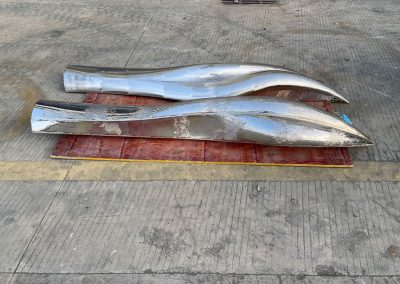He doesn’t know what kind of steel the plates are made from, but it is heavy and is probably high carbon steel to take all the pounding it gets on its real job. Kevin decided to weld two plates together, grind down the weld, flip over the 2 pieces of metal, and weld them on the other side, and he has his base.
As most of his viewers know, Kevin is not a big fan of stick welding and doesn’t do a lot of it. So why choose stick, or arc, welding now? The steel is thick; it’s good practice; he can have the doors open while he welds; and he’ll get good penetration. He can really crank this little welder up, get a lot of amps on it, and really get a good weld so he won’t have to worry about it coming apart.
To get the metal ready, he put a stone on his 7″ angle grinder and got some bright, shiny metal. Then he pulled the stone down at opposing angles and got a nice “V” to weld down into so he can get good penetration. Kevin also left a 1/16″ of an inch gap between the 2 pieces so he can get way down inside.
Kevin is going to run some 5/32 7018 arc welding rod. The AHP Alpha 160ST, which has an arc welder and a lift start TIG welder, will only go to 160 amps, so let’s crank it up and make some sparks!
Kevin puts on his welding safety equipment and, in 2:14 minutes, runs 1 long bead with the stick welder. He then takes his hammer and knocks off the slag. That’s something nice about 7018 rod: give it a swipe with the hammer, and the slag falls right off. He finishes cleaning the weld with a wire brush and shows the weld, which isn’t bad for a guy who doesn’t arc weld very often.
In case you’re wondering why didn’t Kevin tack the metal on the ends or in the middle, he’d already welded the other side with the same machine. That’s also why he could weld the length of the 2 plates in a single pass, something you wouldn’t normally do.
Kevin also addressed whether he was weaving while he welded or just what pattern he used. The answer: none at all. He just went straight down the joint because he had ground that nice groove down the metal and was using a big fat rod to fill it in. This way the weld is almost flat. He can just touch it with the grinder to finish it.
Keep in mind that he is creating a base for a sculpture that might weigh 150 pounds, and the base will probably be buried anyway. All he needed was something structurally sound.
Now that he’s ready to get back to work, you have time to visit https://kevincaron.com to see more how-to videos and his latest sculptures. Well, you might want to stick around for another moment to hear him tumble over his tongue ….

